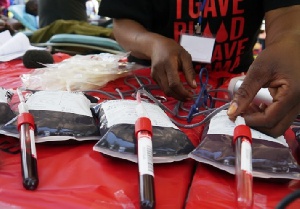 Over 200 people willingly donated to support this initiative
Over 200 people willingly donated to support this initiative
Madam Tina Naa Ayeley Mensah, the Deputy Minister of Health, has encouraged Ghanaians to regularly donate blood to replenish the country’s depleting blood banks so that medical practitioners could expeditiously get blood to manage emergency cases.
Madam Mensah, also the Member of Parliament for Weija-Gbawe, who made the appeal at a blood donation drive at Tetegu in the Ga South Municipality on Saturday, said blood was needed to stabilise and save expectant mothers, who sometimes bled profusely after delivery and to support accident victims. She commended the blood donors for their show of patriotism and entreated other public and private spirited-organisations and individuals to support blood donation exercises.
The blood donation drive was organised by the Ridge Hospital in collaboration with the Grand Central Enterprise Limited, a key Unilever distributor and the Unilever Ghana Limited.
About 200 blood donors, including the staff of the Grand Enterprise, well-wishers and residents of Tetegu voluntarily donated blood.
The Ridge Hospital team, comprising medical doctors, nurses and laboratory technicians were expected to collect 200 pints of blood at the end of the exercise.
The Deputy Minister of Health said blood donation had a lot of health benefits, including prolonging one’s lifespan and reduction in sickness, noting that within every 39 days the blood in the human body expired, therefore, people needed to donate blood on regular basis to create room for new blood to be formed.
Madam Mensah said blood was precious in saving lives because unlike medicine, it could not be manufactured and, therefore, urged all and sundry to voluntarily donate blood as part of their civic responsibility.
Dr Emmanuel Addipa-Adapoe, a medical officer with the Ridge Hospital blood bank team, said the health facility had become a major referral centre that received critical surgical and complicated medical cases, which often needed blood for patients.
He said the hospital’s average blood transmissions a day was 30 pints, which pre-supposed that it required between 10, 950 and 11,000 pints of blood within a year for patients.
Dr Addipa-Adapoe said a frequent shortage of blood at the health facility necessitated the move to embark on the voluntary drive so that there would be available blood at the bank for expeditious management of emergency cases. Currently, he said, the hospital had about 50 pints of blood in stock, which implied that the hospital was in deficit of blood, hence the need for the citizenry to donate blood regularly to help save lives.
“Therefore what we are doing here will help augment the bloodstock,” he added. The medical officer said persons from 17 to 50 years and weighing 50 kilogrammes and above were eligible to donate blood.
However, Dr Addipa-Adapoe said sickle cell patients, persons with fresh tattoos on their bodies, women on their menstrual period and hypertensive persons on drugs, as well as those who had undergone fresh vaccination, were not qualified to donate blood.
On benefits of donating blood, he said, a voluntary donor’s card would be issued to donors so that when a relative was in need of blood, the person could freely access blood from the hospital.
Madam Joyce Okyere-Darko, the Managing Director of the Grand Central Enterprise, who supported the exercise, said it felt obligated to save lives, especially pregnant women who often needed blood after delivery.
She said the Company had dedicated the month of April to donate blood to save lives, which formed part of its Corporate Social Responsibility, noting that blood donors would be given food, cocoa products and other gift items to replenish them.